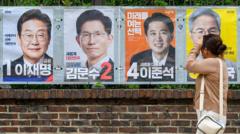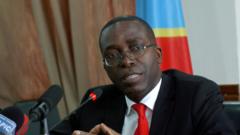As South Korea prepares for its presidential election, Lee Jae-myung's tumultuous journey through political chaos and personal controversies has positioned him as a leading candidate, challenging traditional norms within the political landscape.
Political Turbulence Breeds Frontrunner for South Korea's Presidency

Political Turbulence Breeds Frontrunner for South Korea's Presidency
Lee Jae-myung capitalizes on a constitutional crisis, rising to the forefront of South Korea's presidential race amid ongoing scandals.
In a stunning twist of fate, former opposition leader Lee Jae-myung has emerged as a frontrunner in South Korea’s presidential race, largely due to political upheaval triggered by a constitutional crisis. Prior to December 3, 2024, Lee faced numerous legal challenges, including ongoing investigations into corruption and accusations of power abuse, which appeared to jeopardize his second presidential bid. However, a failed martial law declaration by former president Yoon Suk Yeol drastically reshaped the political landscape, propelling Lee to the forefront as the Democratic Party candidate.
The shift in fortunes for Lee, now 61, is notable. At the time of Yoon's martial law attempt, he was grappling with a conviction for false statements made during the 2022 election campaign, a conviction that still looms over his political aspirations. Characterized by many as a divisive figure, Lee’s journey from humble beginnings to political prominence has polarized public opinion. According to Dr. Lee Jun-han from Incheon National University, his bold political reforms and clashes with established power structures have garnered him fervent supporters as well as strong critics.
Lee’s backstory speaks volumes; having grown up in poverty, he forwent middle school to help support his family. His resilience led him to a successful legal career and ultimately to politics. Starting as a human rights attorney, Lee gained a reputation while serving as mayor of Seongnam and then as governor of Gyeonggi Province, where he initiated wide-ranging welfare policies and effectively managed the Covid-19 response, often at odds with the central government.
However, Lee's rise has not been without personal scandal. From allegations of drink-driving to extramarital affairs, such controversies could hinder his appeal in a conservative society like South Korea. Currently, he juggles ongoing legal troubles from a high-profile land development case and contradictory rulings regarding his past campaign claims, which threaten his electoral candidacy.
A significant moment in Lee's campaign occurred after an assassination attempt in January 2024, which raised alarms about escalating political polarization. With his security significantly heightened following the incident, Lee has assumed a more cautious approach throughout the campaign.
The martial law crisis ultimately provided Lee with the opportunity to portray himself as a defender of democracy. His dynamic call to action against Yoon's abrupt declaration galvanized public sentiment, leading to widespread protests and heralding his ascension as the Democratic Party's candidate. Following Yoon’s impeachment, Lee quickly positioned himself for the presidential election scheduled for June 3, 2025, leaving him as a frontrunner despite the legal hurdles he still faces.
Looking ahead, if Lee's ongoing legal issues culminate in a guilty verdict post-election, it could drastically curtail his political ambitions and reshape South Korea’s political narrative. With tensions high and the future uncertain, the nation holds its breath as it navigates these turbulent waters—both politically and judicially.


















